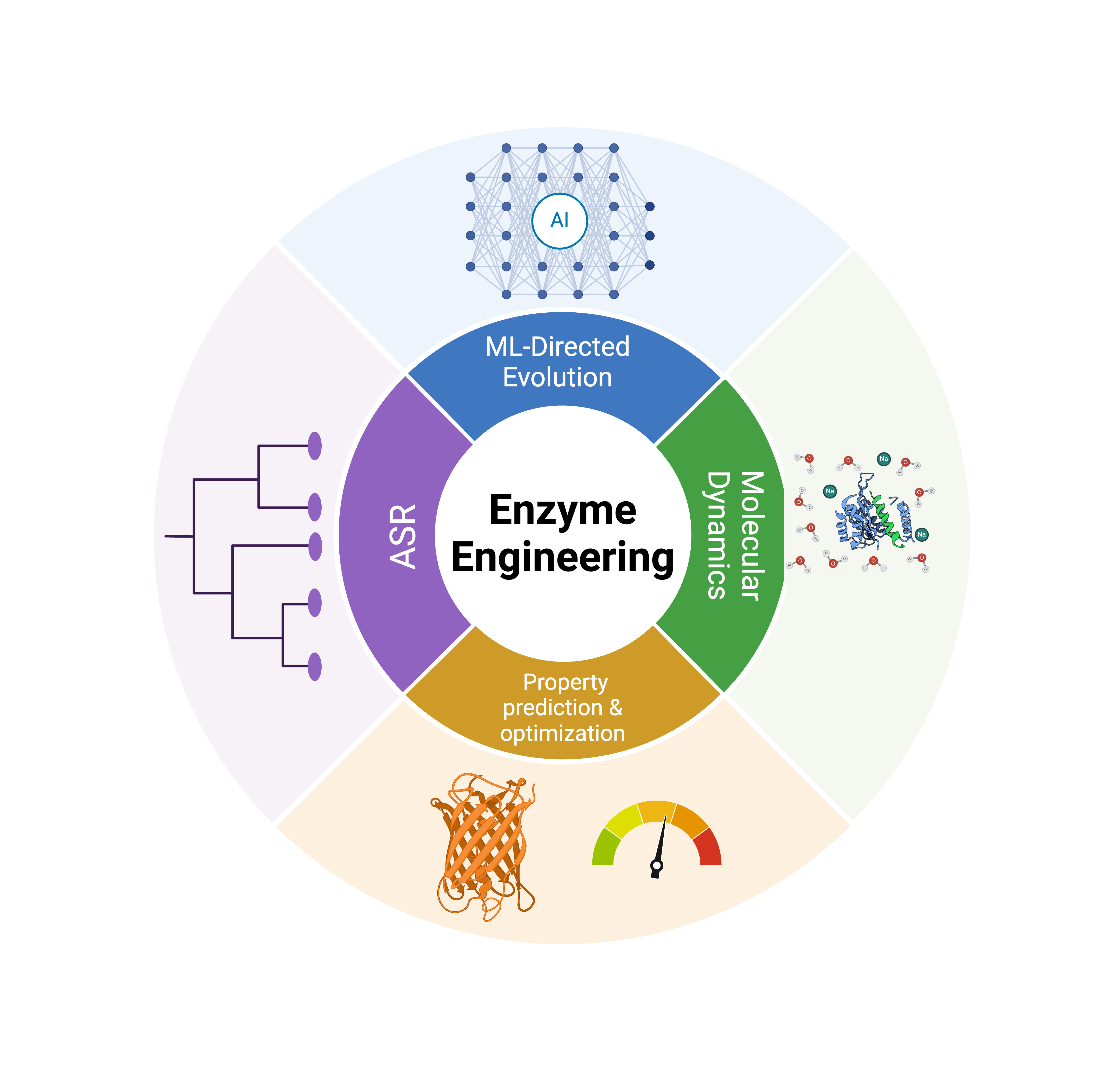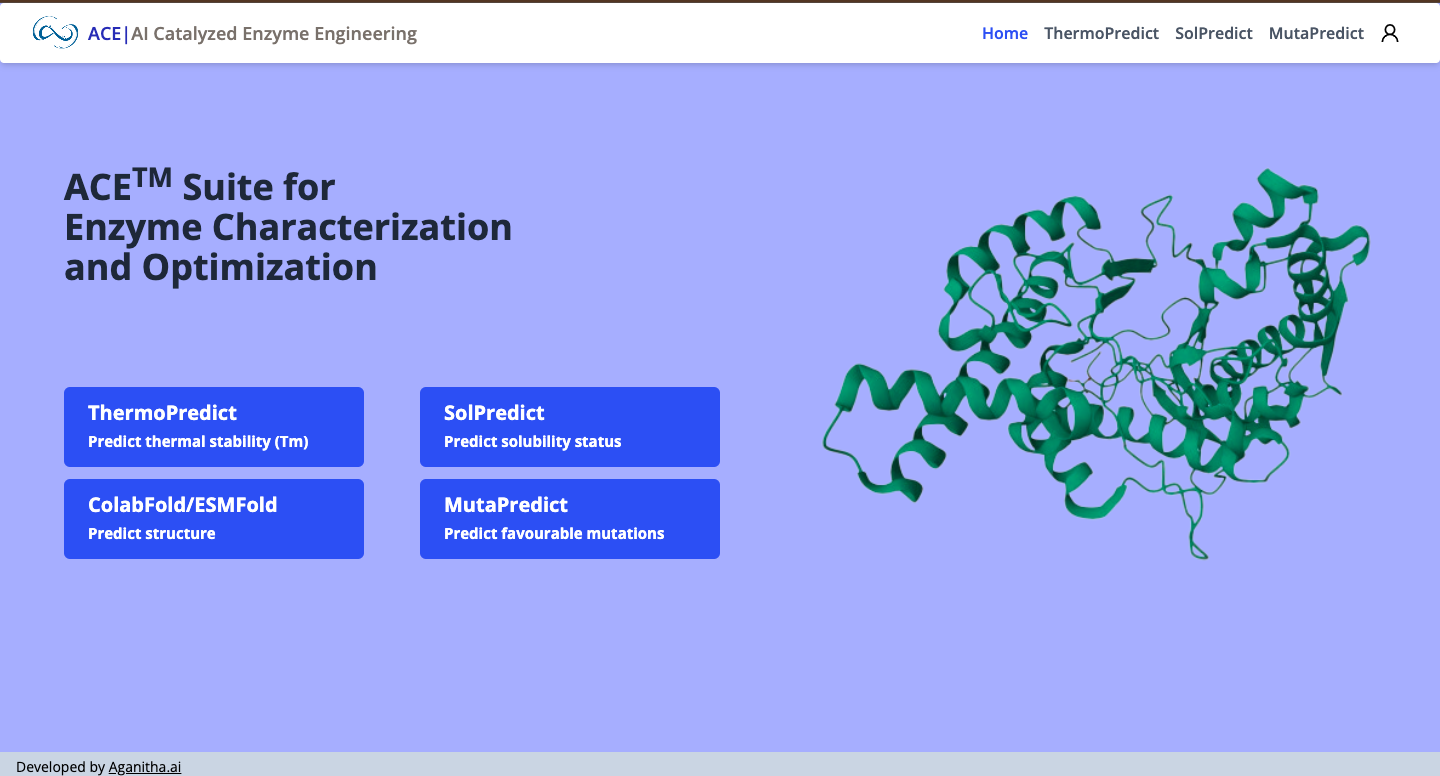Enzyme Engineering
GenAI powered in silico enzyme characterization and optimization
AI assisted next-gen enzyme design
Enzymes play key roles in biopharma industries, both as therapeutics and biocatalysts. Optimizing enzymes for higher activity, stability, and solubility is not easy with traditional lab based methods alone, given the large combinatorial space of possible enzyme designs.
Aganitha’s AI catalyzed enzyme engineering (ACE™) suite accelerates enzyme design, characterization & optimization with traditional methods such as ancestral sequence reconstruction and ML-directed evolution with generative AI solutions.
Key Solution Areas
Solution area
Therapeutic enzymes
Ancestral enzymes often exhibit enhanced thermal stability, substrate flexibility, and activity, which can be leveraged for modern therapeutic applications. Our solutions combine proven methods like Ancestral Sequence Reconstruction (ASR) and generative AI to accelerate development cycles and unlock new possibilities in enzyme-based therapeutics.
Ancestral sequence reconstruction
Ancestral enzymes serve as robust starting points for discovering superior enzyme variants. We harness the power of automated Ancestral Sequence Reconstruction (ASR) and Protein Language Models (PLMs) to improve upon the design of enzyme therapeutics.
Enzyme properties prediction
We employ deep learning powered tools to predict enzyme properties such as thermal stability, solubility and activity, speeding up variant testing and reducing load on wet lab experiments.
Structure modeling
We leverage deep learning models and Molecular Dynamics (MD) to predict 3D structures and mechanisms of the enzymes providing insights into stability and function and guiding which ancient sequences may be most suitable for laboratory synthesis.
Solution area
Enzymes as biocatalysts
Our solutions enhance traditional biocatalysis pipelines by integrating AI/ML models for ML-driven directed evolution, enabling the design of enzymes for maximum reaction efficiency, and desired specificity, selectivity, and stability.
ML-driven directed evolution
Instead of testing random mutations, we utilise active learning approach to enable the ML models to identify the enzyme variants with most likely improved target traits, such as stability, specificity, or reaction efficiency.
Molecular dynamics powered reaction analysis
Our solutions employ in-depth simulation of enzyme interactions, providing insights into structural changes and reaction mechanisms making it easier to identify impactful amino acid substitutions.
Solution area
Enzyme property characterization & optimization
Protein language models enable characterization & multi-objective optimization of enzymes.
Sequence and structure homology
We bring together multiple AI/ML tools and knowledgebases for sequence based and structure based homologs search. Eg. users can retrieve sequence homologs from NCBI BLAST, structural homologs from large protein databases, and conduct multiple sequence and structural alignments.
Predict enzyme properties
We employ deep learning models to predict enzyme properties such as thermal stability and solubility, enabling rational enzyme design and speeding up variant testing.
Prediction of evolutionarily favourable mutations
We leverage various sequence and structure aware protein language models to generate evolutionarily favoured enzyme variants from large protein databases, and conduct multiple sequence and structural alignments.
Would you like a demo?
Highlights
AI accelarated enzyme discovery reducing cycle times and costs
Integrated, no-code workflows
Integrated workflows with multiple AI/ML models and data sources streamline the discovery process, reducing effort and saving valuable time.
Data privacy and safety
We bring infrastructure as code to your data in your own local or cloud environment ensuring that your data is safe.
Configurable and scalable
Scalable computational resources with on-demand cloud-based High Performance Computing (HPC) clusters workload management techniques.
Discover our offerings across the biopharma value chain
Our Solutions
Our Services
Offering services in computational sciences and technology to complement biopharma R&D

